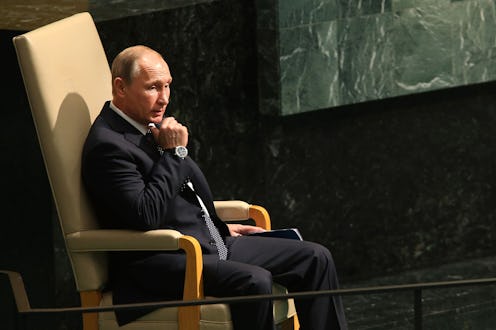News
What To Make Of Putin's Response To Metrojet Crash
Russian President Vladimir Putin's response to the crash of Metrojet Flight 9268 on Saturday has been surprisingly quick and no-holds-barred. The three-term president has called for Russian involvement in the investigation, sent top Russian officials to Cairo, called on prime minister Dmitry Medvedev to organize a special commission on the disaster, and declared Sunday a national day of mourning in the country.
Russia has seen a large number of tragedies on this scale, particularly considering the country's population of just 144 million people. Sputnik News reported in October 2012 that over the previous decade a national day of mourning had been declared 13 times. The most recent on that list was in commemoration of the floods of 2012 that killed 171 people near the Black Sea, but six others involved air tragedies, caused by a mix of terrorism plots, pilot error and equipment failures.
Given the large number of disasters since Putin first came to power in 2000, Putin's response has been especially large and public — even for a politician known for grandiosity. National days of mourning have been commonplace but in his first reaction to tragedy, Putin's government kept the investigation closed and tried to control media speculation.
Putin has always worked to cast a big shadow in foreign policy and is famous for tiger-filled Siberian vacations, but this may be one of the first times that his reaction to a public disasters has reached the same scale.
The Sinking Of The Kursk Submarine
The first big tragedy during Putin's presidency in Russia was the sinking of the Kursk submarine in August 2000. There were two explosions on the submarine, both of which were noticed by nearby ships. It took the Russian Navy six hours to acknowledge the incident and more than 16 to locate the ship. Russia at first denied offers of help from other countries. Seven days after the initial blast, Norwegian divers discovered that all 118 on board had died. The next month in a Larry King interview, when asked what happened, Putin simply said, "It sunk."
Dubrovka Theater Siege
In October 2002, 40 Chechen militants took 912 Russians hostage at a theater in Moscow. The building was under siege for three days until Russian security forces pumped sleeping gas into building and took out the assailants. The only problem? About 130 hostages died from the effects of the gas. Medics were not on hand in advance to help resuscitate victims and nearby streets were not cleared to help ambulances make it to the scene. There was no investigation.
Beslan School Siege
In September 2004, armed Chechen rebels took 1,200 children and adults hostage at a school in Beslan, North Ossetia, a region near the Georgian border. The siege lasted three days until Russian security forces stormed the building using tanks and other heavy weapons. More than 330 people were killed, more than half of whom were children. At the time, Russia was accused of impeding the media coverage of the siege and spreading misinformation.
Airbus Crash In Irkutsk
A 19-year-old Airbus operated by S7 Airlines, Russia's second-largest carrier, with 203 people aboard shot off the runway after landing and hit a concrete wall. It was slammed into pieces and burst into flames. Only 78 people survived; 125 were killed. The accident was blamed on pilot error.
Krasnodar Krai Floods
Until Saturday, Putin's biggest tragedy after returning to the presidency was the Krasnodar floods. One hundred seventy-one people were killed during torrential rains and flooding in the southern Russia region of Krasnodar. Residents hadn't received a warning from the government in time and coverage showed many climbing to their roofs trying to escape. Putin demanded a full report on the disaster and how it was handled.
Putin's Response
Beginning with the Kursk disaster and later with these following disasters, Putin called for a national day of mourning for each tragedy. Some argued this was to draw attention away from the government's bumbling of the response. The language in that declaration was much the same as the day of mourning issued for this Sunday. The Russian flag was lowered to half mast and television channels were instructed to cancel entertainment programming.
Given the open nature of the Metrojet investigation (investigators from several countries are participating) and Putin's loud calls for a robust Russian response, Putin is not trying to distract from a bungled investigation — it's just getting started — but it could be an attempt to control or manipulate the investigation's future findings, or perhaps offer a different version of the events if he doesn't like the results of the inquiry. Both an ISIS attack and problems with maintenance would be bad for Russia.
Whatever happened, tragedies like these are damaging to the national psyche. After a jet carrying a hockey team crashed in 2011, several Russian commentators told The Christian Science Monitor that tragedies like a plane crash erode the public's trust in the system. Given, Russia's tough economic spot from EU sanctions and low oil prices, that's the last thing Putin needs.
Getting out in front of the problem may help this time with public opinion, but answers after the fact will not comfort the families whose loved ones were on board.
